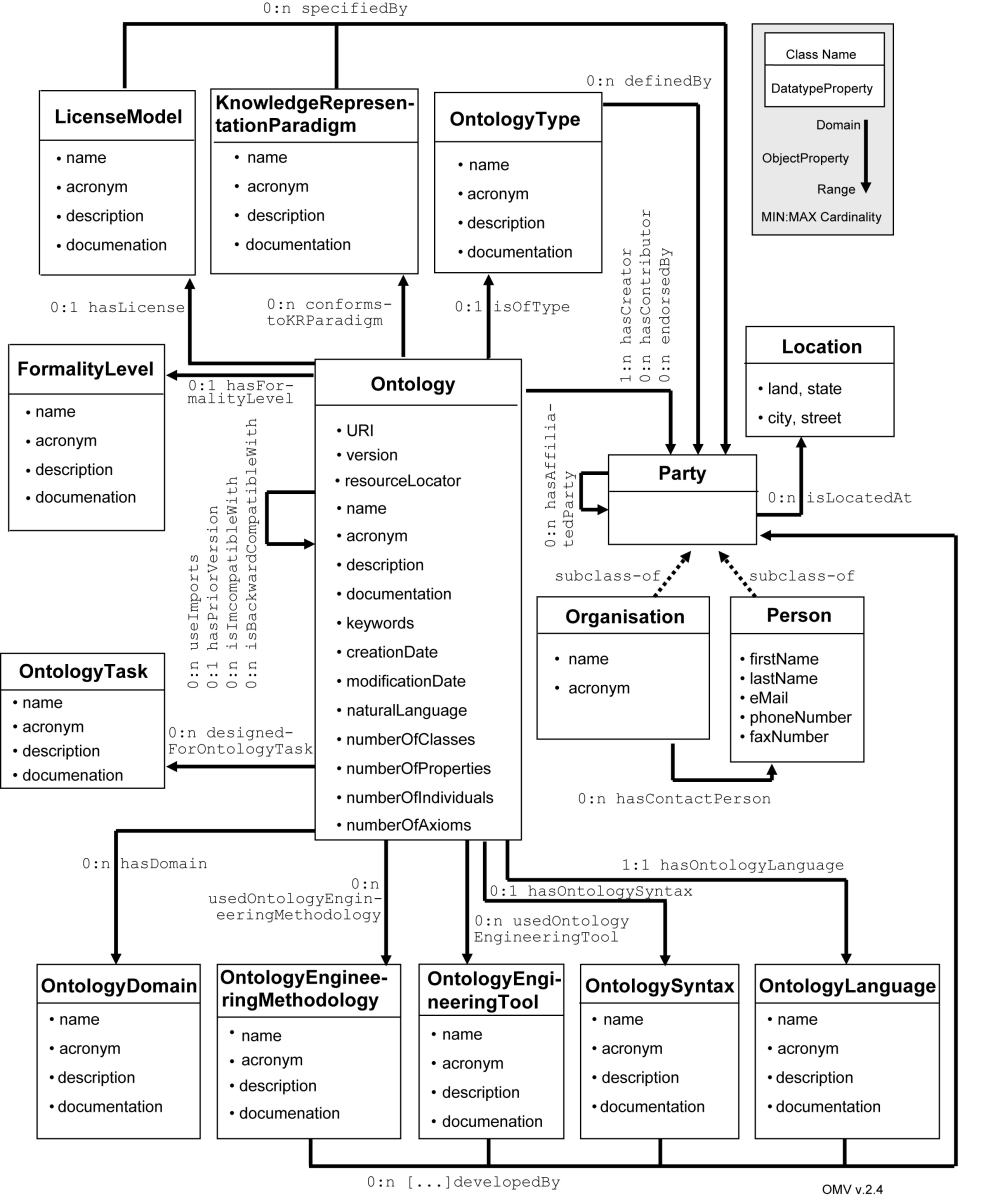OMV - Ontology Metadata Vocabulary
The Ontology Metadata Vocabulary OMV is a standard proposal for describing ontologies and related entities. The OMV metadata schema is formally represented as ontology and is designed modularly: OMV distinguishes between the OMV Core and various OMV Extensions. The core captures information which is expected to be relevant to the majority of ontology reuse settings, while the extensions allow ontology developers and users to specify task/application-specific ontology-related information (e.g. mappings, ontology evaluation, ontology changes, etc).

When would you have to use it?
Ontologies have undergone an enormous development in many domains within the last years, especially in the context of the Semantic Web. Currently however, efficient knowledge sharing and reuse, a pre-requisite for the realization of the Semantic Web vision, is a difficult task since it is hard to find and share existing ontologies because of the lack of standards for documenting and annotating ontologies with metadata information. Without ontology-specific metadata, developers are not able to exploit existing ontologies, which leads to problems of interoperability as well as duplicate efforts. Then, in order to provide a basis for an effective access and exchange of ontologies across the web it is necessary to agree on a standard for ontology metadata, that is a common set of terms and definitions describing ontologies, that is called metadata vocabulary. Hence, OMV enables users from academia and industry to identify, find and apply - basically meaning to reuse - ontologies and related entities effectively and efficiently.
How to use it?
Ontology developers can easily create OMV extensions to specify task/application-specific ontology-related information. These extensions should be compatible to the OMV core schema but at the same time fulfil the requirements of a domain, task or community-driven setting. The OMV elements are classified according to their impact on the prospected reusability of the described ontology content (e.g. required, optional) and according to the type and purpose of the contained information (e.g. availability, provenance, applicability, etc.). Some examples of the usage of OMV can be found in applications such as the Oyster GUI of the NeOn toolkit (http://neon-toolkit.org/wiki/Oyster-GUI) or Watson Semantic Gateway (http://watson.kmi.open.ac.uk/WatsonWUI).

Where has it been used?
OMV has been used in the EU IST thematic network of excellence Knowledge Web and in EU NeOn project. It has already been successfully implemented by several semantic web applications within both projects and is the schema used to annotate networked ontologies within the NeOn toolkit. In particular, OMV provides the basis for interoperability at tool level through a common interface to ontology registries/repositories (e.g. Oyster, Centrasite) and related applications like the semantic web gateway Watson. Additionally, other entities outside our projects (e.g. Protègè project) are becoming interested in adopting OMV.
Publications & News
The OMV consortium is currently working towards the standardization of OMV in close collaboration with the Stanford Center for Biomedial Informatics Research (BMIR). Hence, the OMV consortium will be in charge of the further development and standardization activities. Some publications of OMV are:
- Hartmann, J.; Bontas E.; Palma R.; Gómez-Pérez, A.: "DEMO - Design Environment for Metadata Ontologies." In: Proceedings of the 3rd European Semantic Web Conference, ESWC 2006. Volume 4011. June 2006. Budva, Montenegro. Springer Berlin. 427-441. Conferencia ranking A.
- Hartmann, J.; Palma, R.; Sure, Y.; Haase, P.; Suarez-Figueroa, M. "OMV- Ontology Metadata Vocabulary". In: Proceedings of the International Workshop on Ontology Patterns for the Semantic Web, located at the conference International Semantic Web Conference, ISWC2005. November, 2005. Galway, Ireland.
- Palma, R., Hartmann, J.; Haase, P. "O M V - Ontology Metadata Vocabulary for the Semantic Web". Technical Report Version 2.4. 2008.
Created under Creative Commons License - 2015 OEG.

